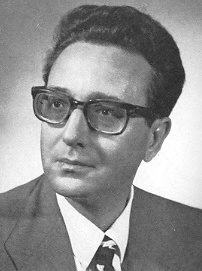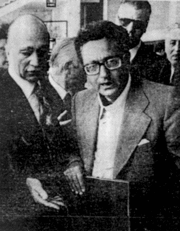Pino Rauti facts for kids
Quick facts for kids
Pino Rauti
|
|
|---|---|

Rauti in 1972
|
|
| Secretary of the Italian Social Movement | |
| In office 14 January 1990 – 7 July 1991 |
|
| Preceded by | Gianfranco Fini |
| Succeeded by | Gianfranco Fini |
| Member of the European Parliament | |
| In office 25 July 1989 – 19 July 1999 |
|
| Constituency | Central Italy |
| Member of the Chamber of Deputies | |
| In office 25 May 1972 – 22 April 1992 |
|
| Constituency | Rome |
| Personal details | |
| Born | 19 November 1926 Cardinale, Italy |
| Died | 2 November 2012 (aged 85) Rome, Italy |
| Political party | PFR (1943–1945) MSI (1947–1957) ON (1957–1969) MSI (1969–1995) FT (1995–2002) MIS (2004–2012) |
| Spouse | Brunella Rauti |
| Children | Isabella Rauti |
| Occupation | Journalist, politician |
| Military service | |
| Allegiance | |
| Branch/service | |
| Years of service | 1943–1945 |
| Rank | Capomanipolo |
| Battles/wars | World War II |
Giuseppe Umberto "Pino" Rauti (born November 19, 1926 – died November 2, 2012) was an Italian politician. He was a key figure in Italy's far-right political groups for many years. He started his political career in 1948. Rauti helped create the Italian Social Movement (MSI) and led it for a long time. He was known for being part of the more radical side of the MSI until the party ended in 1995.
Contents
Early Life and Political Beginnings
Pino Rauti was born in Cardinale, Calabria, Italy. When he was young, he joined the National Republican Guard. This was a military group during World War II in a part of Italy called the Italian Social Republic. After the war, he briefly lived in exile and joined the Spanish Foreign Legion.
In 1946, Rauti came back to Italy. Two years later, he joined the Italian Social Movement (MSI). He quickly became an important member of the party. He also worked with a group called the New European Order. Rauti was influenced by the ideas of Julius Evola, a philosopher. Rauti even edited Evola's journal, Imperium.
In 1954, Rauti started his own group within the MSI called the Ordine Nuovo. However, he became unhappy with the MSI's direction. In 1956, his group left the party. Rauti strongly criticized the MSI leaders as he left.
Facing Allegations
Besides his political work, Pino Rauti was linked to claims about a period of unrest in Italy. This time was known as the "strategy of tension." Rauti was strongly against communism. He wanted to fight communists in two ways. He supported direct street fights with far-left groups. He also suggested secretly joining these groups to encourage more action. Rauti hoped this would create chaos, which he thought would help a new political takeover.
Rauti's name came up during investigations into the Piazza Fontana bombing. He was also said to have attended important meetings about possible unrest in 1969. In 1972, judges in Treviso brought Rauti to trial for possible involvement in the Piazza Fontana attack. However, he was found not guilty because there was not enough evidence. Rauti also had an alibi for the meeting in Padua.
While Rauti was known to be close to some people linked to these events, there was never any strong proof to connect him directly to any illegal actions. He was never found guilty of any crimes related to these allegations.
Returning to the MSI Party

Pino Rauti rejoined the MSI in 1969. He was given a spot on the party's main committee by Giorgio Almirante, the party leader. In 1972, Rauti was elected to the Italian Chamber of Deputies, which is like a parliament.
Rauti's influence in the MSI grew in 1977. This happened when a more moderate group left the party. This allowed Rauti's ideas, based on Julius Evola's philosophy, to become more important. He focused on young people by organizing "Camp Hobbit." These events were fun and casual for young party members. They were very popular. Because of this success, the MSI's youth group, the Fronte della Gioventù, joined Rauti's side. His influence continued to grow when he became a leading figure in the European Parliament in the 1980s.
In 1987, Rauti was the MSI's deputy-secretary. He ran to become the new leader after Giorgio Almirante. His opponent was Gianfranco Fini. Rauti continued to promote Evola's ideas. He also supported ideas like "ethnopluralism," which means different cultures should live separately. Fini, who had more moderate ideas, won the leadership vote.
Leading the MSI
Even though he lost, Rauti's position in the party soon became stronger. Fini tried to make the MSI more like the National Front party in France. He wanted to focus on being against immigration. This change worried many, as it seemed Fini was moving away from the party's original ideas. This big change, along with some poor election results, led to Rauti replacing Fini as leader in 1990.
As leader, Rauti wanted to show that the party's ideas were revolutionary. He argued they should not be seen as simply "right-wing." He also spoke against the United States and Western values. However, the party got only 3.9% of the votes in the 1990 regional elections. This was the worst result in MSI history. After another drop in support in local elections in Sicily, Rauti was removed from leadership in July 1991. Fini became the leader again.
Fiamma Tricolore Party
Pino Rauti continued to criticize Fini's leadership. In 1995, Fini announced that the MSI would be dissolved. In its place, a new party called the Alleanza Nazionale would be formed. Rauti saw this as abandoning the original ideas of the MSI. So, he led a group of members to break away and form the Fiamma Tricolore party. He believed this new party would continue the original path. Many thought this party would be small, but it did surprisingly well in the 1996 election. It even won a seat in the European Parliament in 1999.
Later Years
Rauti stepped down as leader of Fiamma Tricolore in 2002. Luca Romagnoli took over. Romagnoli decided to work with Silvio Berlusconi's political group. Rauti strongly disagreed with this direction. Because of his criticism, he was removed from the party he had founded in early 2004.
After that, he started his own party, called the Social Idea Movement. Pino Rauti passed away in Rome at the age of 85.
Personal Life
Besides his political career, Pino Rauti was also a well-known journalist. He joined the staff of the Rome newspaper Il Tempo in 1953. He also worked as a correspondent for Aginter Press in Italy.
His daughter, Isabella Rauti, is a senator from Mantua. She married Gianni Alemanno in 1992. Alemanno was the Mayor of Rome from 2008 to 2013.
See also
- Radical right (Europe)
 | Delilah Pierce |
 | Gordon Parks |
 | Augusta Savage |
 | Charles Ethan Porter |

